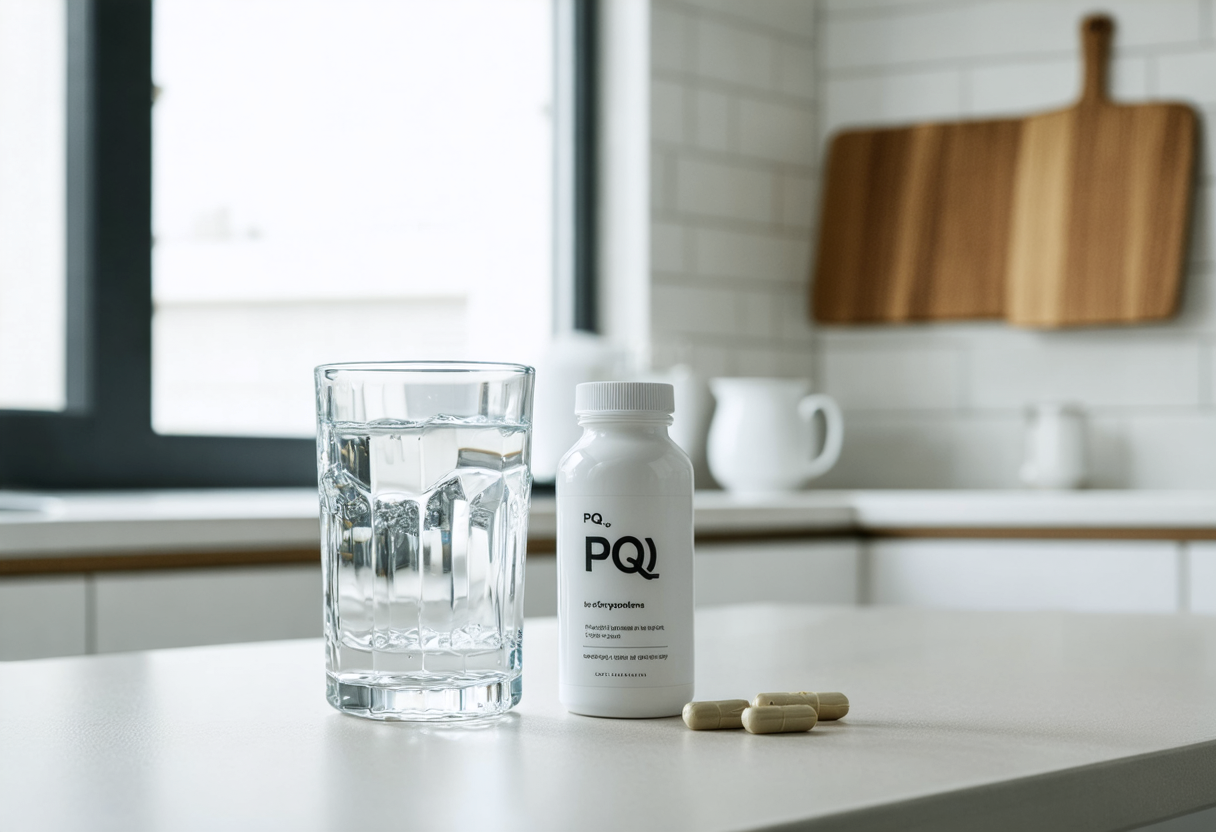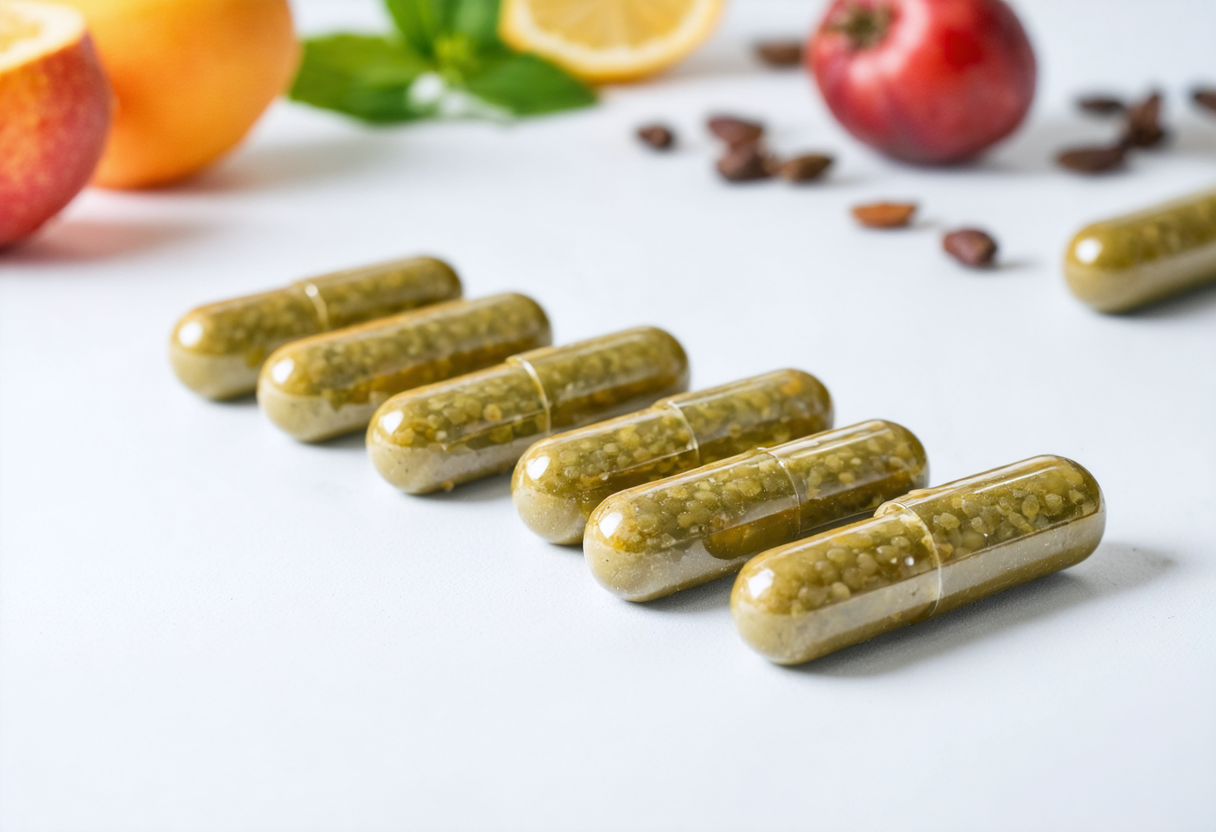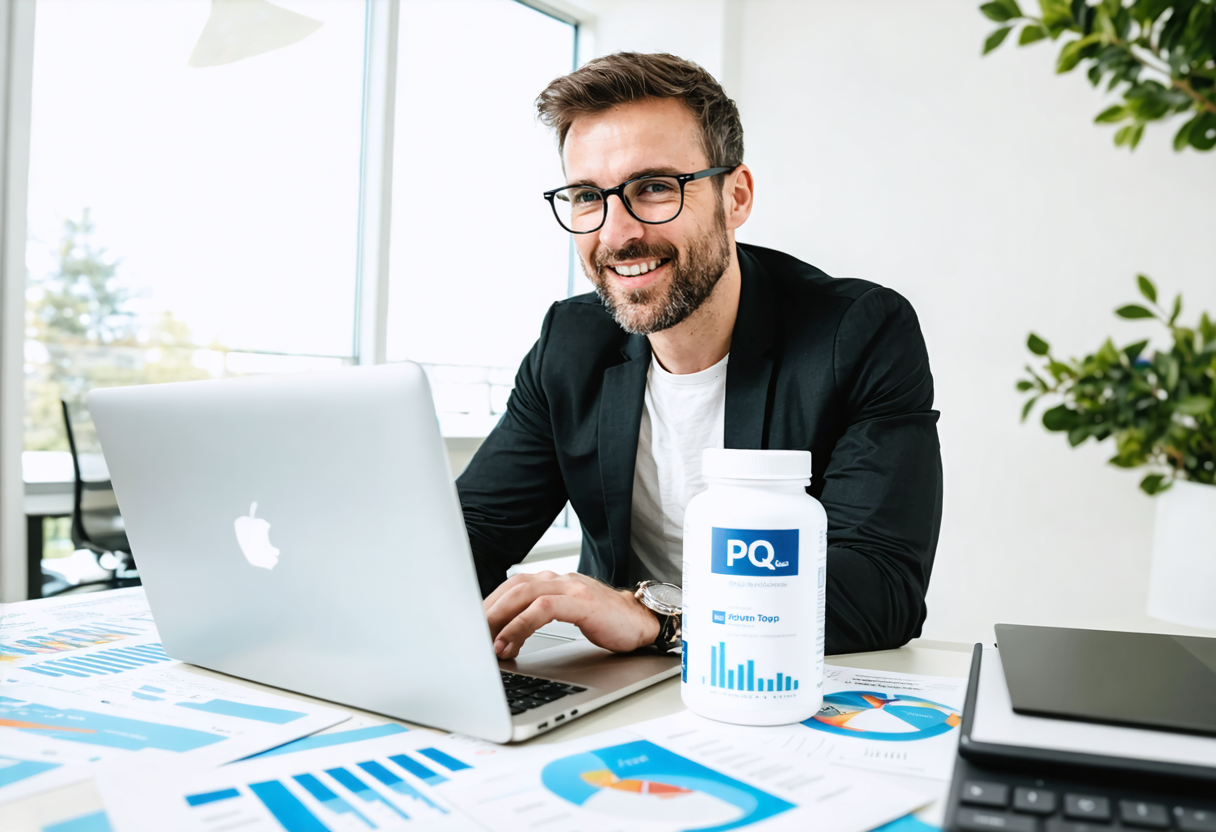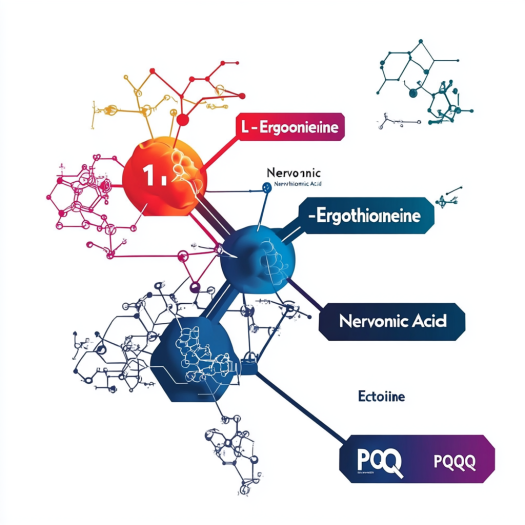
I still recall the day I first heard about PQQ—it was like stumbling onto a secret that everyone else missed.
PQQ, also called Pyrroloquinoline Quinone, has been linked to mitochondrial health and cellular energy support, which some believe could indirectly influence how long we live. Current research, however, remains inconclusive on whether PQQ can reliably extend human lifespan.
I’ve often wondered if there’s more beneath the surface.
Is PQQ Really Tied to Longer Life?
This question popped into my head during a late-night chat with a researcher friend who told me stories about early PQQ studies.
Scientists note that PQQ may enhance mitochondrial function, reduce oxidative stress, and support cell health. While some animal studies hint at longevity benefits, there’s no firm consensus for humans yet. Long-term trials are needed to confirm PQQ’s direct impact on human lifespan.

I remember staying up way past midnight a couple of years ago, scrolling through scientific articles about PQQ. I’d heard enough rumors—some folks called it the “fountain of youth” molecule, while others dismissed the hype. What I discovered was a web of fascinating studies, many focusing on how PQQ influences mitochondria, the tiny “power plants” of our cells. These mitochondria produce the energy we need to think, move, and simply exist. Over time, if our mitochondria falter, we might experience increased fatigue, slower recovery, and potentially more vulnerability to age-related problems.
PQQ’s most discussed mechanism is its role as a cofactor in certain enzymatic reactions. In simpler terms, it may help specific enzymes function better, promoting more robust cellular energy output. Additionally, some studies hint that PQQ might help our cells grow additional mitochondria, a process called mitochondrial biogenesis1. To me, that’s where the longevity angle often comes in: if we can maintain or even increase the mitochondria that churn out energy, we might preserve youthful vitality longer. In animal models, better mitochondrial health can translate into improved lifespan. For example, in certain rodent studies, supplementation with PQQ seemed to offset some of the negative effects of a poor diet or oxidative stress. That’s intriguing, but we have to remember that humans aren’t just big mice.
Another major factor is oxidative stress—basically the wear and tear on our cells from reactive molecules called free radicals. Our bodies naturally produce some of these radicals, but lifestyle factors such as pollution, poor diet, and chronic stress can push the production higher. Antioxidants can help neutralize these reactive molecules. PQQ, known for its antioxidative properties, might shield cells from some free radical damage. And since chronic oxidative stress2 is frequently linked to the aging process, there’s a logical bridge between antioxidant strategies and longevity discussions.
However, we can’t jump to conclusions. Research in humans is still evolving, and long-term, large-scale clinical trials on PQQ and lifespan remain scarce. While we’ve seen smaller studies indicating improvements in energy levels or cognitive function, it’s a leap to say PQQ definitively extends human life. Scientific proof takes time and repetition, sometimes spanning decades. One study might show a small positive shift, while another might reveal no discernible change in markers of aging.
In the meantime, I see PQQ as part of a broader wellness toolkit. Yes, it’s compelling. Yes, the science about mitochondrial support and antioxidant effects is promising. But is it the key to living to 120? That’s far from settled. I often compare it to a puzzle piece: it can fit into a larger picture of healthy habits—good nutrition, regular exercise, quality sleep, and stress management. Without those other pieces in place, any single supplement’s impact might be minimal. And with them, PQQ might add a supportive nudge in the right direction.
At Santa Biotech, we’re cautious about making grand claims. We produce PQQ through natural fermentation for use in functional foods, supplements, and other health products. If you’re curious about how we handle PQQ specifically, you can always check out our official PQQ product page. We emphasize purity, safety, and bioavailability because we believe those factors are essential for any nutrient, PQQ included. Ultimately, while we encourage exploring PQQ’s potential, we also advocate for a balanced perspective, remembering that true, sustained longevity is rarely attributable to a single compound.
Does PQQ Improve Energy and Vitality?
I remember trying a PQQ supplement on a whim—on top of my usual morning coffee—just to see if I felt any difference.
Many users report heightened energy and sharper focus after taking PQQ, likely due to its role in mitochondrial function. While anecdotal accounts are positive, scientific results vary, and real-world benefits may differ from individual to individual.

Years ago, I wouldn’t have believed that tiny molecules like PQQ could alter how I feel day to day. But as I immersed myself in biotech, I learned the difference that subtle changes in our cells can make. Picture your typical morning: you wake up, rub your eyes, and maybe you’re not bouncing out of bed. You’re dragging a bit. This drag can be the cumulative effect of aging mitochondria3. They’re still producing energy, but at a somewhat diminished rate. Over weeks, months, and years, that shortfall can add up, leaving you feeling chronically tired.
Enter PQQ. One hypothesis is that by supporting mitochondria or even helping create new mitochondria, PQQ might give a measurable boost in energy. Some smaller clinical studies do suggest that participants experience reduced fatigue or increased alertness when taking PQQ consistently. Others mention better sleep quality, which can indirectly improve daytime energy levels. But keep in mind, these studies are still relatively small, and the improvements—while noticeable to some participants—aren’t universal. I’ve met people who tried PQQ and felt no difference, while others described it as a secret weapon for tackling a busy schedule.
One personal anecdote: I decided to start taking PQQ during a season in my life when I was traveling extensively for trade shows and industry events. I was juggling multiple time zones and living out of suitcases. Within a week or two, I sensed a more stable energy flow throughout the day, particularly in the early afternoons when I used to slump. Did it revolutionize my stamina? Not exactly. But it felt like an extra gear I could shift into when I needed to stay mentally sharp.
What’s more intriguing is PQQ’s potential synergy with other ingredients. For example, it often pairs well with CoQ10 or certain B vitamins in energy-support blends. The logic is simple: if PQQ works at the mitochondrial level, and CoQ10 also supports mitochondrial function, combining the two might yield a more pronounced effect. Some companies even incorporate adaptogens like Rhodiola Rosea or functional mushrooms, aiming to create a comprehensive “energy and focus” supplement. At Santa Biotech, we see requests all the time from brands wanting to formulate unique combos, harnessing PQQ as a core ingredient.
Still, we have to be realistic. Supplements can help fill gaps or support certain biochemical pathways, but they can’t replace the fundamentals—good sleep hygiene, balanced nutrition, and stress management. If you’re pulling all-nighters and living on junk food, a sprinkling of PQQ might not fix your energy woes. But if you already follow a decent routine, PQQ could provide that extra “nudge” in your day, whether it’s for staying focused in meetings or remaining energized during workouts.
In essence, does PQQ boost energy and vitality? Possibly. The science isn’t set in stone, but the anecdotal stories and some early research are intriguing. As with any supplement, results depend on multiple factors, from dosage and product quality to individual metabolic variations. That’s why I suggest viewing PQQ as part of a well-rounded regimen—one piece of a bigger puzzle aimed at feeling your best.
Can PQQ Protect Cells from Aging?
One of the biggest questions I get is whether PQQ can shield cells from the relentless march of time—something that’s top of mind for many.
PQQ is believed to combat cellular aging by neutralizing free radicals and encouraging mitochondrial resilience. While lab tests show its antioxidant potential, real-world longevity benefits remain under investigation, making it a promising but not guaranteed solution for cellular aging.
I remember my grandmother’s wise words: “Age creeps up on you when you’re not watching.” She wasn’t a scientist, but her intuition that aging was a slow and steady process aligns with what researchers understand: aging is cumulative damage at the cellular level. Oxidative stress, inflammation, and genetic factors all play roles in how quickly or slowly we age. The notion that PQQ might help “slow the clock” is largely tied to its antioxidant qualities and its relationship with mitochondria.

Antioxidants, in general, donate electrons to neutralize free radicals, preventing these reactive molecules from damaging cell structures like DNA and proteins. This is crucial because excessive free radical damage has been linked to a wide range of age-related conditions, including cognitive decline. PQQ, with its unique molecular makeup, is considered a potent antioxidant, potentially more stable in certain reactions than some well-known antioxidants like vitamin C. But while test-tube studies and animal models highlight these benefits, we can’t automatically transpose those findings onto complex human aging. Our bodies are remarkably intricate, and many variables—genes, lifestyle, environment—dictate how quickly or slowly our cells degrade.
Another angle is mitochondrial support. If mitochondria falter, cells can’t produce energy efficiently, leading to a domino effect where tissues and organs might start underperforming. PQQ’s potential to enhance mitochondrial biogenesis (the formation of new mitochondria) fascinates me because it suggests we might help our cells stay “younger” internally. Yet as compelling as that sounds, the research on humans over long periods remains limited. We might see improved markers or certain quality-of-life measures, but does it translate to fewer wrinkles or a longer health span?
In my role at Santa Biotech, I’ve encountered brands that want to combine PQQ with other cell-supportive ingredients, like Ectoine or Ergothioneine, in one formulation. Their goal is a sort of multi-pronged approach to cellular well-being. Each ingredient might target a different angle—Ectoine is often associated with cell membrane stabilization4 and hydration, while Ergothioneine is another antioxidant with intriguing properties. The synergy could be beneficial, but again, real-world results can vary widely from person to person.
I also think it’s critical not to oversell the concept of “anti-aging.” Aging is a natural process that can’t be fully halted—though we can support our bodies to age more gracefully. If you view PQQ as a tool in your health kit—much like a balanced diet, consistent exercise, and stress reduction—then sure, it might help fend off some aspects of cellular decline. But if you expect PQQ to singlehandedly knock decades off your biological age, you’ll likely be disappointed.
I recall a conversation with a friend who was convinced that PQQ could “turn back the clock” on her skin. After taking it for a couple of months, she said her energy improved but her skin didn’t magically transform. That experience underscores the broader truth: it’s easy to place all our hopes on a single nutrient, but real cellular health emerges from multiple avenues—nutrients, habits, genetics, and environment. Nonetheless, PQQ stands out as a strong candidate in the antioxidant realm, even if it’s not a magic wand for reversing every sign of aging.
How Does PQQ Fit into a Long-Term Wellness Plan?
When people learn about PQQ’s potential perks, they often wonder if it’s just a short-term hack or a viable addition to a long-term lifestyle strategy.
PQQ can become a steady ally in your daily routine—especially when paired with balanced nutrition, regular exercise, and other targeted supplements. By promoting mitochondrial efficiency and antioxidant defense, PQQ may amplify overall wellness over time rather than offer an instant fix.
I recall my earlier attempts at a health overhaul—fad diets, a random supplement here and there, and intense workout spurts that fizzled out in days. None of it stuck because I lacked consistency and a deeper understanding of how each part of wellness works together. Now, with more experience under my belt, I see PQQ as something that fits into a broader tapestry of everyday habits that build health bit by bit.
For instance, if I’m looking to optimize cognitive function—maybe because my job in biotech involves juggling a lot of data and strategy sessions—I can’t just rely on a PQQ capsule each morning. I also need decent sleep, mental breaks, regular hydration, and a well-rounded diet. PQQ might add a level of cellular support that complements those habits, but it doesn’t replace them. I believe the synergy between daily movement, quality macronutrients, and strategic supplementation fosters the best possible environment for results.

Moreover, the idea of sustainability5 matters. Some folks jump onto the next health craze with wild enthusiasm, only to abandon it within weeks. But PQQ, being a supportive nutrient rather than a quick-acting stimulant, might not show dramatic effects right away. The changes might be subtle and build up over weeks or months. For me, that’s actually a good sign. I’m wary of anything that promises overnight miracles because our bodies rarely work that fast. Instead, incremental improvements in energy, mood, or recovery can be more durable in the long run.
Another factor is dosage and formulation. Many people just grab the cheapest bottle from a random online retailer without checking the source, purity, or synergy with other ingredients. I’ve seen cases where individuals took a substandard PQQ product and concluded “PQQ doesn’t work.” That’s like buying a knock-off phone charger and blaming the entire tech industry when it fails. Sourcing matters—especially with something as specialized as PQQ. That’s why at Santa Biotech, we go the extra mile in producing fermentation-based PQQ that meets global standards. We also help our B2B clients craft well-rounded formulations that might include supportive nutrients like B vitamins or L-carnitine, aiming for a more comprehensive approach.
One personal tactic I use is “stacking” routines—pairing small, healthy rituals so they become second nature. Let’s say I’m already having a protein-packed breakfast; I’ll set my PQQ supplement next to my coffee mug. This visual reminder ensures I don’t forget. If I’m focusing on stress management, I might do a quick breathwork exercise right after taking PQQ each morning. Over time, these pairings build a lifestyle rather than isolated habits.
In a sense, PQQ fits right into the concept of “kaizen6,” the Japanese philosophy of continuous improvement. Instead of dramatic leaps, we aim for small, steady upgrades in how we fuel and care for our bodies. If we keep layering beneficial elements—like consistent water intake, balanced meals, daily movement, and well-researched supplements—our overall health trajectory can shift in a more positive direction. And who knows, maybe the sum of these improvements might extend not just the quantity of life, but also the quality of those extra years.
Will PQQ Alone Extend My Lifespan?
Many of us get excited by the notion that a single supplement might hold the key to extra decades on this planet, so this question always bubbles up.
No single supplement, including PQQ, can guarantee a longer lifespan by itself. While research suggests it may support better cellular health, true longevity usually involves comprehensive lifestyle measures that combine multiple factors beyond supplementation.

I can’t tell you how many times I’ve seen glossy ads touting a pill that’ll “add years to your life.” I get it—the promise of living longer is deeply tempting, especially if that extra time comes with good health and vitality. But the human body is so complex that pinning longevity on one nutrient or supplement oversimplifies the reality. Even if PQQ offers amazing support for mitochondria, and even if it helps fend off oxidative stress, that doesn’t translate into an ironclad guarantee of extra years.
When I reflect on my own journey, I see how many moving parts contribute to well-being. Nutrition, exercise, sleep, emotional connections, mental challenges, genetics—they all weave together. Think of it like a recipe for a beautiful cake: you need the right combination of flour, sugar, eggs, baking powder, and so on. If you leave out half the ingredients or swap them with poor substitutes, the cake might flop. PQQ, at best, is one ingredient in your “longevity recipe6.” It might improve the texture or flavor, but it can’t carry the entire dish.
Consider the role of genetics. Some folks are blessed with genes that allow them to live into their 90s, even with average health habits. Others might face genetic predispositions that raise the risk of chronic conditions. A nutrient like PQQ could help mitigate some risks, but it can’t override DNA. This is especially true when lifestyle factors—like chronic stress or a high-sugar diet—pile on additional strain.
Don’t get me wrong, PQQ is worth a look. Supporting mitochondria is crucial for maintaining youthful energy and resilience. But the best approach I’ve found is layering PQQ alongside other beneficial activities. For instance, a moderately calorie-controlled diet that prioritizes whole foods, combined with consistent exercise—like brisk walking or gentle resistance training—can synergistically work with PQQ. If you’re adding in mind-body practices like yoga or meditation, you’re further reducing stress, which in turn can help keep inflammation in check. Each layer builds on the next, creating a stronger foundation for healthy aging.

One important note: some companies might over-promise, weaving partial truths into big marketing claims. Always look for scientific references and, if possible, talk to health professionals. That’s one reason at Santa Biotech we avoid definitive statements like “PQQ extends lifespan.” Instead, we emphasize it as a supportive nutrient that could complement an overall health plan. That honesty has earned us trust among B2B partners who want real solutions, not just flashy headlines.
So, does PQQ alone extend your lifespan? Probably not. But can it be a valuable ally in a lifestyle that promotes better energy, reduced oxidative stress, and balanced aging? Quite possibly. That’s the essence of a realistic viewpoint—recognizing that each piece, from your diet to your mental health, contributes to the puzzle of longevity. PQQ might be a vibrant and beneficial piece, but it’s not the entire picture.
| Factor for Healthy Aging | Possible Influence on Lifespan |
|---|---|
| Balanced Diet | Provides essential nutrients, lowers risk of chronic disease |
| Regular Exercise | Enhances cardiovascular health, muscle strength, and metabolic balance |
| Adequate Sleep | Supports cellular repair and cognitive function |
| Stress Management | Reduces inflammation and hormonal imbalance |
| PQQ Supplementation | May bolster mitochondrial health and antioxidant defense |
Conclusion
Strive for a balanced lifestyle first, and consider PQQ as one valuable piece in your healthy aging puzzle.
-
Learn about mitochondrial biogenesis and its crucial role in maintaining energy levels and promoting longevity. ↩
-
Discover how oxidative stress affects aging and how antioxidants like PQQ can help mitigate its effects. ↩
-
Understanding mitochondria’s role in energy production can help you grasp why supplements like PQQ may be beneficial. ↩
-
Discover how cell membrane stabilization contributes to overall cellular health and its implications for aging gracefully. ↩
-
Discover how sustainability principles can improve your health and lifestyle choices for a better future. ↩
-
Discover the essential ingredients for a longevity recipe that promotes healthy aging and overall well-being. ↩ ↩

